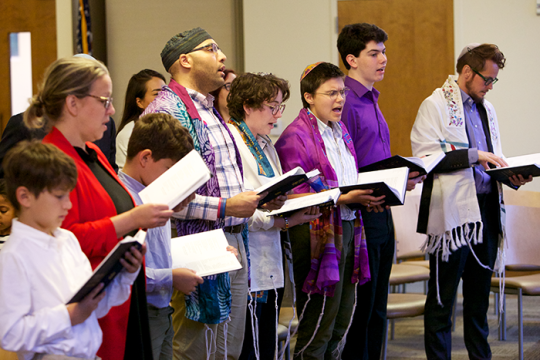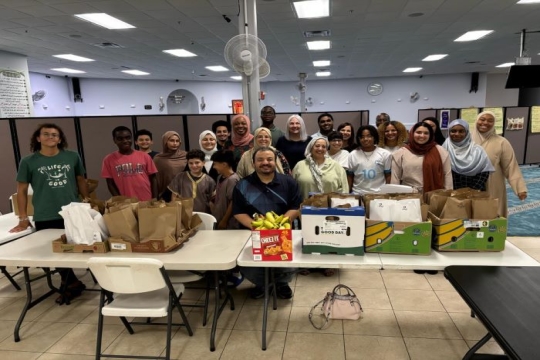
The public health crisis unleashed by the spread of coronavirus (COVID-19) is forcing leaders across the Jewish community to confront what may seem to be brand new challenges. But while the scale of the outbreak is unprecedented, the questions we’re hearing from many of you are familiar ones: How do I keep my congregants safe? Which types of technology can I use to best reach our members? What does community mean for Reform Jews during turbulent times?
To help you navigate these universal questions in this unique moment, I want to share a three-stage framework that congregational leaders have found effective in navigating this situation so far. The stages cover safety, logistics, and community-building, and remember: The stages are not linear and you will move back and forth across them.
You are not in this alone. Keep an eye on this post, as well as on Rabbi Rick Jacobs’ post “How Reform Congregations Are Coping with COVID-19 – and Tools to Help” and the Inside Leadership blog in general, for continued resource-sharing.
The URJ is here to help you every step of the way.
Stage 1: “Go / No Go”
Amid government guidelines to limit public gatherings, most congregations, like other organizations across North America, have had to make the first decisions in this stage. This was when we first asked: Should we keep the synagogue open for services? Should we keep operating religious school? If our building closes, how should we handle payment for hourly employees?
New go/no go decisions will continue to arise as the situation evolves.
The answers to these questions should be rooted in your congregation’s mission and core values. Especially amid challenging times, your congregation’s foundational statements can help you focus and remind you of the values that guide your community.
These resources may be helpful to congregations that are still in or grappling with questions related to step one:
- [Webinar] Top 10 Questions about Congregational Finances in Light of COVID-19: We recently hosted a webinar to discuss the top 10 questions we’ve been hearing from you about finances and how to move forward with optimism.
- Questions to Consider: We’ve compiled a list of questions your leadership should ask itself on topics like suspension of services, event refunds, facility considerations, and more.
- Responsibility Chart: This guide may help your congregational leaders on making go/no-go decisions about programming and more.
- "A Jewish Values Matrix for Dealing with a Time of Illness": Rabbi Joseph Black shared this valuable values-based matrix, which has been helping his congregation make decisions and act in a consistent manner that is in line with Jewish tradition and modern sensibility.
- Sample Email: Not sure what to say in your email to congregants about event cancellations and building closures? Tweak this helpful template.
- “The Mitzvah of Canceling: What Guided Our Congregation’s COVID-19 Decisions”: Read this first-person account by Rabbi Ilana G. Baden and Alison Siegel Lewin of Temple Chai from Long Grove, IL.
Stage 2: Logistics of Virtual Operations
As your congregation begins to cancel in-person activities, it is logical to wonder what virtual operations should look like: Do we move all programming online? Do certain activities need to stop? For what we’ll keep doing, how, exactly, do we do it virtually?
Many congregations are already operating in this stage but do not have the technology or know-how to stream services and otherwise reach congregants at home. Here are some resources that can be help move into this stage and make the most of it:
Streaming Services:
- “How to Stream Services (Or Anything Else): A Guide for Jewish Communities”: Designed to help congregations that are new to streaming, this document includes explanations, step-by-step directions, a technological checklist, copyright information, and more.
- “Webinar: Movement Worship Streaming”: Watch a recording of this recent session, hosted in partnership with the CCAR, to learn even more about streaming services and other congregational programming.
Streaming Meetings and Programs:
- [Webinars] Training Sessions on Best Principles and Logistical Applications of Gathering Online: As your congregation moves programming opportunities online, join us for learning sessions on streaming adult education, small groups, and meetings; using the Zoom platform most effectively; and convening congregational small groups online. Recordings of these calls will be posted in The Tent, for those interested but unable to attend the live calls.
- Adult Education, Small Group Gatherings, & Experiential Learning for Adults in an Online Setting: A Guide for Jewish Communities: This universal, comprehensive resource – created by the URJ, HUC-JIR, ARJE, and PEP-RJ – is designed to focus on the “how” and “why” of streaming for communities that are entering this sphere for the first time or as a longer-term approach for the coming weeks. It includes creative and relational advice, as well as technical advice and support.
- "10 Critical Insights for Successful Online Gatherings": These recommendations are divided into three categories: Technical smarts, cultural skillfulness, and strategic value.
- Educational Resources: In collaboration with ARJE and HUC-JIR, we recently hosted a session titled “Strategies for Ongoing Jewish Learning in a Time of Coronavirus.” Watch the recording, posted alongside the slide deck, session chat, and other helpful links.
Discounts for Your Virtual Meeting and Streaming Needs:
- Discounted Streaming and Virtual Meeting Licenses: Given the coronavirus outbreak, the URJ is offering an early release of the Reform Movement Marketplace, which offers discounted licenses for live streaming through Streamspot and for virtual meetings through Zoom. To learn about these services – and other discounts available to URJ member congregations – visit the Reform Movement Marketplace group in The Tent.
Stage 3: Creative Leadership and Innovation in an Unprecedented Time
Once congregations solve the logistics of virtual operations, leaders have the opportunity to think generatively and ask: How do we respond to this moment by bringing our community together in creative ways?
Prayers, Pastoral Insight, and "Judaism at Home":
- “Liturgical Resources for Responding to the Coronavirus”: This CCAR document includes eight pieces of liturgy on handwashing, anxiety, safety, and more.
- "Judaism Under Quarantine: Helpful Content to Share with Congregants Right Now": This evolving and regularly updated resource from ReformJudaism.org includes a list of relevant liturgy, Jewish wisdom, and ideas for engaging with Judaism from home. all of which can be helpful in building community and providing spiritual nourishment during a period of social distancing.
- ReformJudaism.org email newsletters: Subscribe to recieve additional content updates by email.
Social Justice Priorities:
- “Our Jewish Imperative in the Face of Pandemic”: Rabbi Jonah Pesner makes the case for the importance of centering vulnerable communities during this pandemic.
- “Congress Must Protect the Vulnerable During this Public Health Emergency”: Learn about our Movement’s policy priorities in this crisis and how to ask Congress to act on them.
Curriculum:
- Ask Big Questions Guides: Offering opportunities for small groups of congregants to gather online? Use these guides created especially for congregational leaders, plus an introductory resource to help make the most of them.
- Ben Franklin Circle Curriculum: Looking for more content for your online small group gatherings? This toolkit, created by the URJ, 92Y, and Central Synagogue, is designed to help you to facilitate a powerful dialogue about Jewish and American values.
- Gifts of Awareness Online Course: Our partnership with the Institute of Jewish Spirituality allows you a discount on this eight-module online meditation course. It offers new insight on how to develop awareness that is more consistent with who you want to be in the world, which will allow you to connect more deeply to yourself, others, and Judaism. Use the code: URJ_GoA.
URJ camps and NFTY are also offering online opportunities for children and teens; you do not need to be a NFTY regular or a URJ camper to participate. Check your local NFTY region or URJ camp website or Facebook page for ways for to participate.
Crisis can make people feel powerless, and that seeming loss of agency can be especially devesting to people whose lives have been severely disrupted. But as congregational leaders, you are in a position to take action and provide solace to your members at a time when they need it most.
The entire Reform Movement is behind you – and together, we will help our members through this moment, emerging strong and hopeful for the future.
Related Posts

Collaboration and Connection Power Small Congregations

How URJ Congregations Spark Change and Innovation

